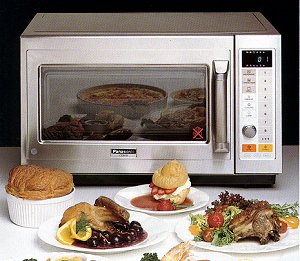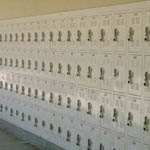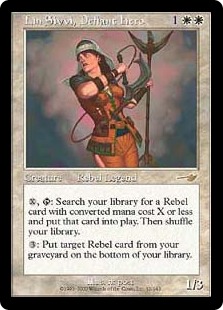
Great Card Shops
Over the last ten years, I have moved and traveled a lot. Due to this very nomadic lifestyle, I have had the opportunity to visit and play at a large amount of hobby stores. I always found strange the shear variance in style, set up, and success. Some of these establishments seemed to be in dire need of a surprise inspection by the CDC or the State Health Department. However, they were operating with a very strong and vibrant Magic community. As such, I have outlined a few of the criteria that produces a successful shop, in no particular order.
Food

The best shops have food at the ready in many forms. The easiest option of any is to move/locate one's shop next to restaurants. The best I have ever seen was a retailer smack dab in between a Subway and Mickey D's, a Burger King across the street, and a Little Caesar's down the block. They are quick, easy, and simple. Besides simplicity, restaurants have other advantages. During long tournaments, it allows players to waste time between matches, keeps food out of the shop, and provides a chance for players to sit down to socialize with one another in a setting besides Magic. Some of my more enjoyable memories have been going to restaurants with fellow players, not the tournament itself.

Even though fridges and freezers allow a shop owner the opportunity and flexibility to decide what they want to offer their clientele, managing food can be a hassle. If this is not your cup of tea, vending machines are a decent alternative. Fresh food out of a machine always seems like an oxymoron. Myself, I am wary of playing refrigerated-food Russian roulette. Nonperishable and frozen items can be offered without that salmonella aftertaste.
At one location, the thoughtful and nice shop owner had placed a board with all the restaurants in the area that delivered with their respected phone numbers and hours. At other locations, I've seen stores stock pamphlets of all the local venues with coupons and menus by the players' area. With this particular site, they even had a designated spot for food pick-up, just enough area to enhance the exchange of pizza and money. Even though delivery can be an alternative, timing can be difficult during a tournament. Food delivered during a match or five minutes before the next match can be awkward. The same goes for getting a bye and still having to wait 30 minutes for its delivery.
As we go down the comic book shop food chain, we have the last alternative of junk food. Sure, chips and candy bars can be decadent, but lack long-lasting satisfaction. It is a temporary solution at best. Don't get me wrong; I love to gorge on chips and chocolate. After many, many hours, I still need something of substance. In the end, I can understand why shops resort to the junk food route. It's nonperishable for the most part, waste is minimal, and emits very little aroma.
At the bottom, many shops do not allow food in their place of business with the occasional exception of junk food. From my experience, the strength of the local playgroup is equal the amount of food available. I don't even bother anymore with an establishment that bans food. To be fair, this can be the result for many reasons such as messy players, space issues, an unaccommodating owner, etc. In the end, the experience is never a pleasant one.
Technology
At the base level, the better shops have a computer, email, and website. It amazes me when certain venues have nothing. The ability to run tournaments with the DCI software is night and day compared to the old method of shaking dice. On top of this, the old method of pairing players takes time. One of the more inventive means of running a tournament was a shop connecting its system to the projectors and big flat screens that normally were utilized for video games to display pairings. In just a couple of minutes, people were sitting across from their opponents. As a player, the presence of a computer gives me confidence that the owner is putting his/her best effort towards making tournaments the best experience possible.
When I was checking out a store during a trip, the store owner quickly accessed and asked if I was new to the area. Moments later, I had a form to fill out. The form included my email, DCI number, and boxes to check for what groups I wanted my email list to be included on. The groups included all the formats, draft, casual draft, tournaments, multiplayer, highlander, cube, etc. I never made it back to that place, but put myself on the email list for a while. It was interesting to see the amount of queues going out for players seeking an additional person for a draft or casual play. Eventually, I took myself off the list. However, I really liked feeling informed and connected even though I wasn't able to attend. This was by far the best utilization of email I have ever seen. It amazes me how few shops utilize this business tool, especially shops that already have computers and internet access. Sometimes I feel compelled to educate these uninformed people that email and other forwarded newsletters are free.

Wi-fi somehow seems controversial to a lot of people. Some argue about the expense. This is true to an extent and I can see truisms to that side. However, is spending $50 on a one time purchase that can last ten years and is tax deductible all that expensive if a shop already has internet access? (Insert quizzical look) Another contention is the fact the shop may attract free loaders. True, but as with most LAN centers, the system can be set to require a password for usage which can be acquired from the store owner for a nominal fee for a password that can be changed daily. It works for Starbucks selling $3 coffee. Why wouldn't it work for comic shops selling $3 packs?
Resisting the urge to further lament my one-sided viewpoints, as a player, I love shops with technology. I have never said as a player that I wished my shop didn't have these features. If presented with identical shops, one with Wi-fi and one without, I would choose the one with Wi-fi.
Facilities
As a new player in a community, it's always difficult to figure out what's going on besides the ever-constant FNM. One of the more helpful tools I have found is the holy grail of the bulletin board. After a quick scan, I can quickly gather when people are playing multiplayer, cube, Elder Dragon Highlander, who's looking for what card, what nights are draft or constructed, etc. The best advantage of a board is that I don't have to interrogate the poor store owner or worker. This interrogation is seldom useful. Most of the time the information is vague or they point to a big calendar on the wall with the obvious of Friday Night Magic on Friday nights. Gee, thanks.

Expanding on this locker idea, a store owner could rent or assign lockers to regular customers. As an incentive, judges or tournament organizers could be given personal lockers. Another advantage, one could share lockers with "trustworthy" friends. I have often pooled collections together in order to make tournament-worthy decks. Having a locker would allow the partner in crime to have access to his/her cards if necessary without having to track me down.
Let's admit one thing, space is at a premium. During one large tournament, it was interesting to observe the owner moving all the bookshelves to make room for the unanticipated large amounts of players showing up. Everything in the shop was on wheels and capable of locking in place once moved. I thought this adaptability and foresight was a very smart move by the owners. After the tournament, they just moved them back. Sure, it may be trivial, but I have to appreciate the ingenuity, especially during an overpopulated tournament.
Lastly, the highest Holy Grail, the gaming area. I'm still shocked at how many locales do not have a play area. If there is a gaming section, the optimal configuration has been an area separated from the shop. There should be a distinct gaming and store area divided by a wall with maybe a window for observation by the owner/worker by a door and each area should have an exit to the street. This solves many problems. If players have food, it doesn't infect the rest of the store with smells of pizza, burgers, Chinese food, and other odors. It also allows a store owner to establish food and soda only in the play area and no food or drink in store rule. As a player, this is a very acceptable arrangement and I still get to gorge on my artery-clogging vices. Another advantage, the store can close while the players have the option of finishing the tournament without the ire of the store clerk barking about the time. If the store closes at 9, the store closes at 9. The play area has an exit. A "trusted" player, judge, or tournament organizer could be placed in charge of removing everyone from the premises once the tournament is over. This allows the store owner to save money while allowing players to play their brains out into the wee hours. The other advantages include reduced noise level in the store, no backpacks in the store (aka. opportunities for theft), and a reduction in traffic.
Organization

Besides this facet, I have a major problem with most cases. They are almost always right next to the register. One annoyance is that you're stuck with a store clerk staring back at you. It's uncomfortable. You could ignore them, but every time you look up, there they are, looking right back at you. With this close proximity, one is stuck in the "conversation" zone. They are just close enough that it forces a verbal exchange. In my experience, it is never pleasant and always awkward. The other major flaw results from having to play musical chairs every time a customer approaches the register. I always have the feeling a being in the way or a nuisance and sometimes getting a stern look from the clerk. It gets even worse when another player wants to scope out the case.

As Magic continues to expand, it is becoming more evident that keeping all the cards organized will be a growing issue, especially with four new sets every year. Just think, ten years from now we will have 40 new sets to build decks from. That means approximately 20,000 new cards.
The standard norm is the binder. It can be cheap and effective. It's usually a good sign when a locale has binders for each set. The major issue with this method is you are still forced into the same uncomfortable situation of having a store clerk gazing back at your while you pan through the pages. In fairness, they are simply keeping an eye out for theft. However, it's just not as enjoyable of an experience as could be. The other issue, older sets of binders begin to show significant wear and tear over the years. Request an Ice Age binder and you'll understand this issue. The card pages have collected a thick layer of finger grime and some are beginning to tear. If a player is yearning for an assortment of cards over many sets, it can be grueling having to request set after set after set.
Understandably, the whole display and storage of cards is a complicated issue and never perfect. The best display/method I have ever seen is the use of drawers. Keep in mind, these drawers are only about an inch thick and made out of metal. Purely estimating, but one could fit about 50 cards in this space under a glass/Plexiglas cover. Each card is placed in a box-like containers. This has been done in two ways, vertically and horizontally. While the horizontal drawers are still nice, I prefer the vertical method. The horizontal drawers, I can only assume, would be subject to mechanical damage quite easily. The other complications are the shear size of the horizontal drawers. Since these drawers are stacked on top of each other, feasibly, only one set can be viewed at a time. The vertical drawers simply negate a lot of these aspects. These drawers hang from the ceiling. Essentially, they function like pocket doors. All the commons were at the bottom, the uncommons in the middle, and the rares at eye level depending on your height. With the extra space above, they had a little poster of the set and a buy list. The more ingenious part of the set up was the drawers slid both ways. The drawers/pocket doors were placed were one would normally find the counter. If a person wanted a Vindicate, the clerk would slide the drawer/pocket door behind the counter, open the lock on the case located on the clerk's side of the drawer, and grab the card. On top of easy access for both the clerk and the customer, the clerk could be simultaneously be stocking other drawers while customers browse other sets. My only critique is the vertical drawers could be spaced a little bit further apart to maximize the number of players browsing.
Now, I have seen a ton of other ways to organize cards. There have been cases mounted on walls, cards placed in poster boards (like the posters you see at Boxmart and flip through in search of your new Hannah Montana poster), and I have even seen a case with rotating platforms. As peculiar and inventive as they may be, none of them work as well as the binders, cases, or the drawers/pocket doors. I truly hope the industry moves away from binders and towards the use of drawers/pocket doors with cases being utilized for only the crème de le crème. At any point, if the store is sloppily organized you can be assured the experience will not be a particularly pleasant one. A good store should at least make some effort into organizing their card stock in a clear and efficient matter.
Customer Service

The other major need of any card shop is the necessity of having knowledge about one's product. Amazingly, I would say 60% of the time the person running the cash register knows nothing, little, or has been out of the game so long they are severely outdated. Very few other venues or businesses could get away with this charade. It should more or less common sense that employees should know something about their product. Now, I am not saying they must be ingrained in the game, but they should be knowledgeable. To correlate, car dealers need to know what type, model, extras, mileage and so on about the vehicles they are selling. How much confidence would you have in your dealer if you requested to see their stock of vans and they began showing you Volkswagen Beetles?
Conclusion
The success of a store relies on many of the above. So, if you are ever visiting or moving to a new area, check some of these factors out before nestling down in a particular shop. Any of these aspects will be a crucial part of your Magic experience. Regardless, find a location you are comfortable with and I hope you have a great experience along the way.
Comments